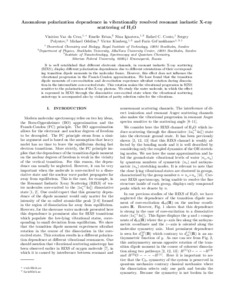Anomalous polarization dependence in vibrationally resolved resonant inelastic x-ray scattering of H2O
Скачать файл:
URI (для ссылок/цитирований):
https://journals.aps.org/pra/abstract/10.1103/PhysRevA.98.012507https://elib.sfu-kras.ru/handle/2311/111079
Автор:
Vinícius Vaz, Da Cruz
Emelie, Ertan
Nina, Ignatova
Rafael C. Couto
Sergey, Polyutov
Michael, Odelius
Victor, Kimberg
Faris Gel’mukhanov
Коллективный автор:
Научно-исследовательская часть
Институт нанотехнологий, спектроскопии и квантовой химии
Дата:
2018-07Журнал:
PHYSICAL REVIEW AКвартиль журнала в Scopus:
Q1Квартиль журнала в Web of Science:
Q1Библиографическое описание:
Vinícius Vaz, Da Cruz. Anomalous polarization dependence in vibrationally resolved resonant inelastic x-ray scattering of H2O [Текст] / Da Cruz Vinícius Vaz, Ertan Emelie, Ignatova Nina, Rafael C. Couto, Polyutov Sergey, Odelius Michael, Kimberg Victor, Faris Gel’mukhanov // PHYSICAL REVIEW A. — 2018. — № 98. — С. 012507 (7)Аннотация:
It is well established that different electronic channels, in resonant inelastic x-ray scattering (RIXS), display
different polarization dependences due to different orientations of their corresponding transition dipole moments
in the molecular frame. However, this effect does not influence the vibrational progression in the Franck-Condon
approximation. We have found that the transition dipole moments of core excitation and deexcitation experience
ultrafast rotation during dissociation in the intermediate core-excited state. This rotation makes the vibrational
progression in RIXS sensitive to the polarization of the x-ray photons.We study the water molecule, in which the
effect is expressed in RIXS through the dissociative core-excited state where the vibrational scattering anisotropy
is accompanied also by violation of parity selection rules for the vibrations.

